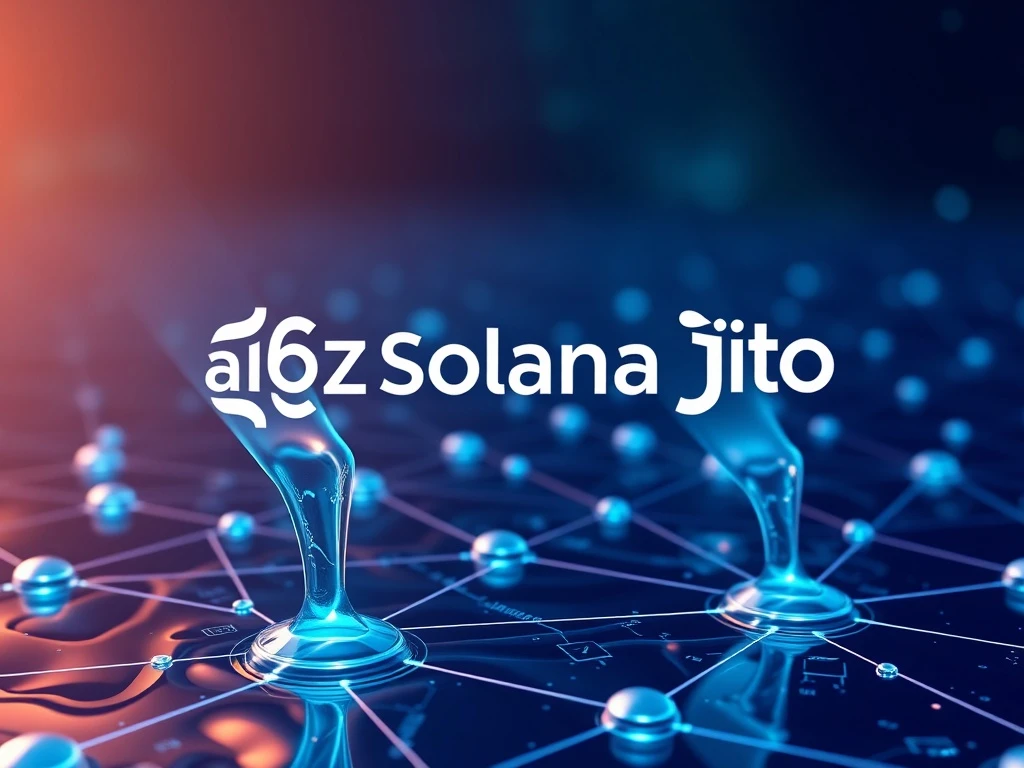Solana Liquid Staking: Strategic $50M a16z Crypto Investment Boosts Jito Protocol

The cryptocurrency world recently witnessed a significant development. Andreessen Horowitz’s a16z Crypto made a substantial **crypto investment**. They injected $50 million into Jito, a leading **Solana liquid staking** protocol. This move signals a strong belief in Solana’s growing ecosystem. Furthermore, it highlights the increasing importance of liquid staking within decentralized finance (DeFi).
A Monumental Crypto Investment in Jito
Andreessen Horowitz, often known as a16z, is a prominent Silicon Valley venture capital firm. Its blockchain-focused arm, **a16z Crypto**, actively backs innovative Web3 projects. This latest $50 million investment targets Jito, a critical liquid staking protocol on the Solana network. Consequently, a16z will receive an undisclosed amount of Jito’s native tokens at a discounted rate. This detail was first reported by Fortune.
Brian Smith, executive director of the Jito Foundation, shared insights with Crypto News Insights. He emphasized the Foundation’s long-term vision. “The investment will allow the Foundation to work to make Solana the home for internet capital markets well into the next decade,” Smith stated. This commitment underlines Jito’s ambition to solidify Solana’s position in the global financial landscape.
Understanding Solana Liquid Staking with Jito
Jito launched in 2022 as a **Solana liquid staking** protocol. It offers users a unique opportunity. They can stake their SOL tokens to earn rewards. Simultaneously, they retain liquidity through JitoSOL, a derivative token. This innovative approach allows participants to engage in DeFi activities while their staked SOL continues to accrue yield.
The **Jito protocol** operates with a clear structure:
- Jito Foundation: Oversees governance and token distribution.
- Jito Labs: Serves as the core developer and infrastructure provider.
Liquid staking provides flexibility. Users avoid the typical lock-up periods associated with traditional staking. Thus, it enhances capital efficiency across the DeFi ecosystem. This mechanism contributes significantly to Solana’s overall security and decentralization.
a16z Crypto’s Expanding DeFi Portfolio
**a16z Crypto** consistently demonstrates its commitment to Web3 innovation. The firm actively invests in various blockchain technologies. These include Web3 infrastructure, decentralized finance, and cross-chain solutions. This $50 million injection into Jito further diversifies their already extensive portfolio.
Recent activities by a16z Crypto:
- April 17: A $55 million token purchase in LayerZero, a cross-chain messaging protocol.
- Same Month: Led a $25 million investment round in Miden, a zero-knowledge (ZK) proof-powered blockchain from Polygon Labs.
These investments showcase a strategic focus. a16z aims to support foundational technologies that will shape the future of decentralized internet. Their backing often signals confidence in a project’s long-term viability and potential impact.
Navigating DeFi Regulation and Jito’s Advocacy
Liquid staking has become a central topic in the United States regulatory debate. The SEC has been scrutinizing how such products fit into existing securities law. **DeFi regulation** remains a complex and evolving area. Jito Labs has actively engaged in these discussions, aiming for clearer guidance.
Rebecca Rettig, chief legal officer at Jito Labs, spearheaded early efforts. She led the first team to meet with the Trump administration on this issue. Smith highlighted her work. He stated that clearer guidance around liquid staking paves the way for JitoSOL’s inclusion in ETFs and ETPs. This represents a key part of the bull thesis for JTO, Jito’s native token.
On July 31, Jito Labs joined asset managers VanEck and Bitwise. They collectively urged the SEC to permit liquid staking within proposed Solana exchange-traded products (ETPs). They argued that liquid staking tokens offer a more capital-efficient and resilient way to integrate staking into ETP structures. This advocacy underscores the industry’s desire for regulatory clarity.
Approximately a week later, on August 5, the SEC’s Division of Corporate Finance issued guidance. This guidance clarified that some forms of liquid staking might not constitute securities offerings. However, this depends heavily on “the facts and circumstances.” While many in the crypto community viewed this as a positive step, not all SEC officials agreed. Commissioner Caroline Crenshaw criticized the guidance, suggesting it “muddies the waters.” She urged caution among liquid staking providers.
Jito Protocol’s Market Dominance and Future Vision
Despite ongoing regulatory uncertainty, liquid staking protocols thrive. They form a vital component of the decentralized finance ecosystem. The **Jito protocol** demonstrates significant market presence. Data from DefiLlama reveals its impressive growth.
Current Total Value Locked (TVL) comparisons:
- Jito: Approximately $2.8 billion
- Marinade (Solana competitor): Roughly $1.9 billion
- Lido (Ethereum’s leader): Around $33.9 billion
Jito’s strong TVL positions it as a leader within the Solana ecosystem. This growth indicates robust user adoption and confidence. In July, crypto fintech platform MoonPay also entered the Solana liquid staking arena. They announced a program offering users an annual yield of up to 8.49% on their SOL holdings. This increased competition further validates the liquid staking model.
Jito liquid staking total value locked. Source: Defillama
The future for the **Jito protocol** looks promising. With strategic backing from **a16z Crypto** and continuous advocacy for clearer **DeFi regulation**, Jito aims to expand its influence. Its innovative **Solana liquid staking** solution continues to attract capital and users. This solidifies its role in shaping the next decade of internet capital markets.










